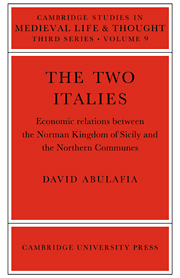Book contents
- Frontmatter
- Contents
- List of maps
- Preface
- A note on the tables
- Abbreviations
- Map
- PART I THE FOUNDATIONS
- PART II THE DEVELOPMENT OF TRADE
- 3 The first phase of alliances, 1116–54
- 4 The maritime alliance of 1156 and its aftermath
- 5 Crisis and recovery, 1162–79
- 6 An age of peaceful competition, 1179–89
- 7 The last phase of alliances, 1189–91
- 8 Quid plura? 1191–5
- PART III THE STRUCTURE OF TRADE
- Conclusion
- Bibliography
- Index
7 - The last phase of alliances, 1189–91
Published online by Cambridge University Press: 02 February 2010
- Frontmatter
- Contents
- List of maps
- Preface
- A note on the tables
- Abbreviations
- Map
- PART I THE FOUNDATIONS
- PART II THE DEVELOPMENT OF TRADE
- 3 The first phase of alliances, 1116–54
- 4 The maritime alliance of 1156 and its aftermath
- 5 Crisis and recovery, 1162–79
- 6 An age of peaceful competition, 1179–89
- 7 The last phase of alliances, 1189–91
- 8 Quid plura? 1191–5
- PART III THE STRUCTURE OF TRADE
- Conclusion
- Bibliography
- Index
Summary
King Tancred of Sicily was elected ruler by the majority of his barons, but he was not a unanimous choice; nor, internationally, could he be sure that old alliances would remain in force. In particular, the Sicilian break with Germany forced Pisa to reconsider its diplomatic position, caught between its oft-asserted loyalty to the Hohenstaufen and its commercial interests in Liguria. Were the two necessarily contradictory? The Pisans reflected on their past deal with Barbarossa and decided that the reactivation of their Hohenstaufen alliance might, in the long term, bring unprecedented commercial rights in the Regno; moreover, the question of legitimacy, of whether the bastard Tancred or Henry and Constance was by right ruler of Sicily, was more clear-cut than in earlier reigns; no longer was the existence of the kingdom in doubt, but only the right to rule it. So, not surprisingly, Pisa began its negotiations with Henry VI well before any signs of a move by Genoa can be identified. Henry was still in Germany, at Kaiserslautern, when he promised, on 28 August 1190, to exempt Pisan merchants from ‘omni theloneo sive dreitura’ in the Kingdom of Sicily, Duchy of Apulia and Principality of Capua; that is, to give the Pisans the right to trade free from the majority of tolls in the kingdom. At whose initiative the grant was made is, however, unclear. Against the generosity of the Kaiserslautern grant it is necessary to place its extreme emptiness at a time when no firm military plans had been drawn up; the privilege derived its real value from the renewal of Pisan trading rights in the German empire.
- Type
- Chapter
- Information
- The Two ItaliesEconomic Relations Between the Norman Kingdom of Sicily and the Northern Communes, pp. 172 - 192Publisher: Cambridge University PressPrint publication year: 1977



